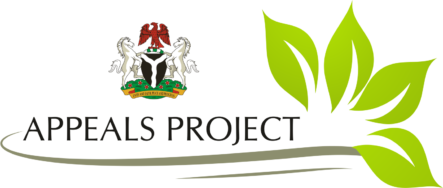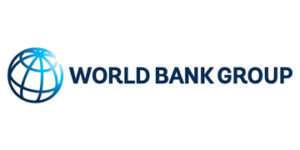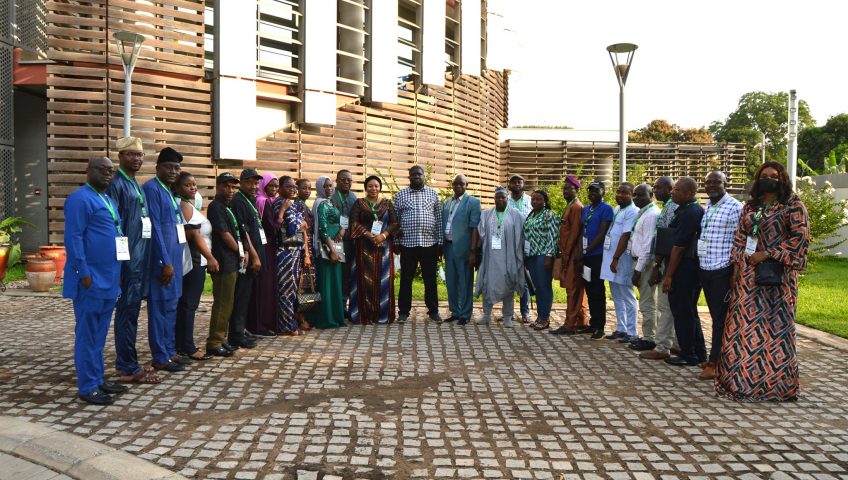A delegation of the Nigeria Agro-Processing, Productivity Enhancement and Livelihood Support (APPEALS) Project has concluded a one-week Study Tour on Knowledge Management to Ghana, as part of efforts to facilitate knowledge acquisition and experience sharing within the West African sub-region.
The Study Tour delegation led by the National Project Coordinator, Alhaji Mohammed Sani Jobdi represented by the Project Operations Manager, Dr. Salisu Garba had participants drawn from the National Coordination Office and Members of the Knowledge Management Core Teams in the six participating states of Cross River, Enugu, Kaduna, Kano, Kogi and Lagos; and was coordinated by the National Communication Specialist and KM Lead, Mrs. Aishat Onusi.
The Key objective of the tour was to visit some institutions and projects in Ghana that are focusing on value chains that are similar to the APPEALS’ priority value chains, in order to learn about how they generate, manage, share, report and preserve knowledge, as well to learn about the systematic sequence of activities Ghana is using to organize and distribute knowledge in the agricultural sector.
The team was warmly received in Accra at the World Bank Ghana Office by World Bank Senior Agriculture Economist and Former Task Team Leader of the APPEALS Project – Dr. Sheu Salau. Also on hand to receive the Nigerian delegation was the official Study Tour Facilitator, an Agricultural Economist, Researcher and Development Practitioner, Mr. Charles Nornoo.
Addressing the delegation at the World Bank Office premises in Accra, Dr. Sheu Salau described Knowledge Management as a key component of World Bank-supported projects put in place by the Bank to enhance effectiveness in project implementation and support the scaling up of project activities. He enjoined participants in the Study Tour to utilize the learning opportunity and take home some useful insights that could help to improve efficiency in project implementation and enrich knowledge sharing within the Project.
Key engagements of the Study tour team included a joint meeting with USAID Monitoring, Evaluation & Technical Support Services (METSS); and the Mobilizing Finance in Agriculture (MFA) held at the METSS office in Accra, during which the two projects shared experiences on Monitoring and Evaluation, Knowledge Management, Learning and Communication. The interactive session featured a Q&A between the Nigerian delegation and the host projects.
The team also met with Ghana’s Ministry of Food and Agriculture (MoFA) to learn about their Data Hub Initiative. The meeting had in attendance the Directorate of Statistics Research & Information and Monitoring, Evaluation & Coordination Team Leader, Directorates of Crop & Animal Production and selected Project Leads focusing on APPEALS’ priority Value Chains; as well as the Tree Crops Development Authority Deputy CEO.
Outside the city of Accra, the team was received at offices of the Cocoa Research Institute of Ghana (CRIG) located at Tafo, Kumasi Metropolitan District by the Executive Director of the Institute – Dr. Francis Kwame Padi; Deputy Director (Cocoa and Kola) – Dr. Richard Adu-Acheampong and Deputy Director (Coffee and Shea) – Dr. Samuel T. Lowor. An interactive knowledge exchange meeting was held with a presentation on how the institute served as the Research Centre for developing sustainable, demand-driven, commercially oriented, cost-effective and environmentally acceptable technologies that support the cocoa industry and other mandate crops such as coffee, Shea, Kola and Cashew. This was followed by a guided facility tour of the institute.
The team also visited the historic Tetteh Quarshie’ s House and Farm established in 1879 at Akuapim-Mampong town in Mampon, Eastern Region of Ghana, where they learned about how cocoa was first brought to Ghana from Equatorial Guinea by Tetteh Quarshie. The team toured the farm and saw the two surviving original cocoa trees planted in 1879, as well as observed a demonstration on how cocoa seeds fermentation is done.
At the end of the study tour, the APPEALS team was equipped with some firsthand knowledge on how relevant filtered information and knowledge products can be properly used and accurately shared across the various stakeholders. The study also afforded the team to stimulate potential partnerships with the visited projects and institutions, thereby fostering intra-regional collaborative action on knowledge and experience sharing.



